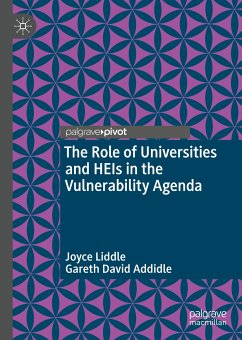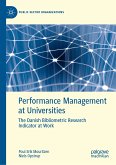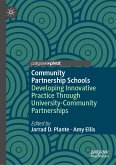Particularly in the midst of the COVID-19 pandemic, universities are being profoundly affected and transformed as steps are taken to modify existing approaches to teaching and learning. Universities have always had an implicit 'duty of care' for their stakeholders, but COVID-19 has brought into sharp focus the need for a more explicit demonstration that University leaders have the social awareness to recognize the importance of protecting and safeguarding the vulnerable in society.
Arguing that HEIs have a significant role to play as a central 'anchor' agencyin the safeguarding of vulnerable individuals, this book fills in gaps in theoretical, empirical and policy/practice understandings. It explores the changing civic and societal (pastoral) role that HEIs have developed in response to the increasingly important policy area surrounding vulnerability.
Joyce Liddle is Professor of Public Leadership and Enterprise at Newcastle Business School, Northumbria University, UK. Over the course of her career she has published over 200 articles, 25 book chapters and 14 books. She currently co-edits an annual book series on Critical Perspectives on International Public Management, and chairs the Editorial Advisory Board of the International Journal of Public Sector Management.
Gareth Addidle is Senior Lecturer in Policing at Teesside University, UK, where he teaches on the undergraduate and postgraduate Policing and Criminology programmes. His research and publications are in the areas of policing, governance, community safety and partnership working. He has worked with a number of police services across the UK and has been involved in research projects with Police Scotland (formerly Strathclyde Police), Devon and Cornwall Police, HMIC and, more recently, Newcastle Business School.
Dieser Download kann aus rechtlichen Gründen nur mit Rechnungsadresse in A, B, BG, CY, CZ, D, DK, EW, E, FIN, F, GR, HR, H, IRL, I, LT, L, LR, M, NL, PL, P, R, S, SLO, SK ausgeliefert werden.









